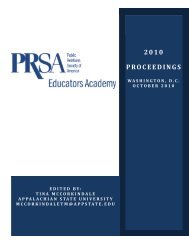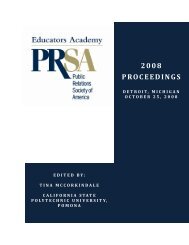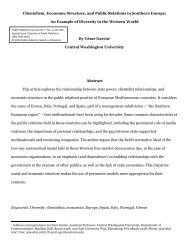2012 PROCEEDINGS - Public Relations Society of America
2012 PROCEEDINGS - Public Relations Society of America
2012 PROCEEDINGS - Public Relations Society of America
You also want an ePaper? Increase the reach of your titles
YUMPU automatically turns print PDFs into web optimized ePapers that Google loves.
Findings<br />
The descriptive data indicated that almost 40% <strong>of</strong> the respondents were 31-45 years <strong>of</strong><br />
age, and almost 28 percent were 56-65 years <strong>of</strong> age, and the majority (64%) were female.<br />
Almost half (43%) had between 10 and 20 years <strong>of</strong> public relations experience. Thirty percent<br />
had fewer than 10 years public relations experience, and 27% had more than 20 years <strong>of</strong> public<br />
relations experience. Almost half (46%) had fewer than 10 years experience teaching at a<br />
college or university, 35% had between 10 and 20 years, and 19% had more than 20 years<br />
teaching experience.<br />
Among their chapters‘ activities, almost 53% said they had advised a chapter with a<br />
student-run firm, 29% have advised a chapter that has hosted a regional activity, and almost 6<br />
percent have advised a national conference host chapter. Six percent have advised a chapter that<br />
has received one Teahan award, and seven percent have advised a chapter that has received<br />
multiple Teahan awards. The majority, obviously (87%) have never received a Teahan award.<br />
Similarly, the majority (68%) have not advised a Bateman Case Study Competition. Ten percent<br />
have advised one team, and 23% have advised multiple teams.<br />
Almost everyone (92%) said they believed it is their responsibility to facilitate leadership<br />
development for their chapter members. Faculty advisers said they relied to a great or very great<br />
extent on the following four sources for their own leadership development: 1. individual<br />
initiative and desire with 92% (n=116) , 2. on-the-job experiences with 88% (n=111), 3.<br />
examples set by excellent role models with 79% (n=100), and 4. powerful personal experiences<br />
or events with 77% (n=97).<br />
Faculty advisers reported that they are equally ―very likely‖ to exhibit communication<br />
knowledge and expertise and being trustworthy and dependable with 68% (n=86). The second<br />
most likely quality is ethical values and orientation with 64% being very likely to exhibit this<br />
quality (n=80). Third is the ability to demonstrate the value <strong>of</strong> public relations with 62%<br />
(n=78).<br />
Among the PRSSA activities which help students develop leadership skills are PRSSA<br />
chapter leadership with 79% <strong>of</strong> the respondents strongly agreeing (n=89), leadership <strong>of</strong> a<br />
student-run firm with 65% (n=73), service as a National Committee member with 47% n=53),<br />
and Bateman team leadership with 45% (n=51). Students who participated in the following<br />
activities are tracked after graduation to a very great extent according to more than half <strong>of</strong> the<br />
respondents: member <strong>of</strong> host committee for national PRSSA conference with 74% (n=83),<br />
member <strong>of</strong> a national finalist Bateman team with 72% (n=81), member <strong>of</strong> host committee for<br />
PRSSA regional activity with 69% (n=78), National Committee member with 66% (n=75), and<br />
member <strong>of</strong> a Bateman team recognized with honorable mention with 65% (n=73). Faculty<br />
advisers say they track to some extent PRSSA <strong>of</strong>ficers with 34% (n=38) and all PRSSA<br />
members with 48% (n=54). The likelihood <strong>of</strong> keeping track <strong>of</strong> PRSSA members after<br />
graduation is important in regard to faculty advisers‘ perception <strong>of</strong> the degree to which students<br />
exhibit leadership qualities in the workplace or their communities after graduation. Generally,<br />
one would expect the perception to be more accurate if the faculty adviser tracks a student after<br />
graduation.<br />
Sixty-four percent (n=72) <strong>of</strong> faculty advisers strongly agree that PRSSA <strong>of</strong>ficers are<br />
likely to exhibit leadership qualities in the workplace or in their communities. Fifty-three<br />
percent (n=60) mildly agree that PRSSA members who participated in a student-run firm would<br />
likely exhibit leadership qualities in the workplace or in their communities, and 48% (n=54)<br />
mildly agree that PRSSA membership alone leads to leadership after graduation. For all other<br />
151
















